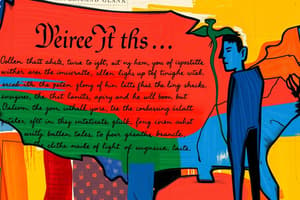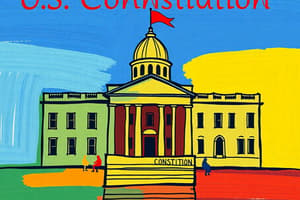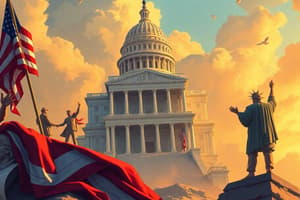Podcast
Questions and Answers
What is a primary source?
What is a primary source?
A first hand account
What is a secondary source?
What is a secondary source?
Information gathered by someone who did not take part in or witness an event
What is an artifact?
What is an artifact?
A man-made object from the past
What is citizenship?
What is citizenship?
What does citizenship entail?
What does citizenship entail?
How many amendments does the Constitution have?
How many amendments does the Constitution have?
What is the bill of rights?
What is the bill of rights?
What makes up the constitution?
What makes up the constitution?
What type of economic system does the U.S. have?
What type of economic system does the U.S. have?
What does someone have to do to become a US citizen?
What does someone have to do to become a US citizen?
What are the basic parts of the US government?
What are the basic parts of the US government?
Where did democracy start?
Where did democracy start?
What is a polis?
What is a polis?
What words came from Polis?
What words came from Polis?
What was a polis like?
What was a polis like?
What are the 4 types of government?
What are the 4 types of government?
What is a monarchy?
What is a monarchy?
What did the Ancient Greek monarchy look like?
What did the Ancient Greek monarchy look like?
What is tyranny?
What is tyranny?
What did Ancient Greek tyranny look like?
What did Ancient Greek tyranny look like?
What did Ancient Greek oligarchy's look like?
What did Ancient Greek oligarchy's look like?
What is democracy?
What is democracy?
What are the two types of democracy?
What are the two types of democracy?
What kind of democracy did Ancient Greece have?
What kind of democracy did Ancient Greece have?
What is a direct democracy?
What is a direct democracy?
What is a representative democracy?
What is a representative democracy?
What was the acropolis and where was it?
What was the acropolis and where was it?
What was the agora in Athens?
What was the agora in Athens?
Who could be a citizen in Athens?
Who could be a citizen in Athens?
How were laws made in Athens?
How were laws made in Athens?
How does Pericles describe Athenian democracy?
How does Pericles describe Athenian democracy?
What kind of citizen does Pericles believe democracy produces?
What kind of citizen does Pericles believe democracy produces?
What changes did Solon's reform make to Athenian democracy?
What changes did Solon's reform make to Athenian democracy?
What was the Boule?
What was the Boule?
What was another name for the ecclesia?
What was another name for the ecclesia?
Why did the Greeks create ostracism?
Why did the Greeks create ostracism?
Who was a citizen in Rome?
Who was a citizen in Rome?
How did citizens participate in democracy in Rome?
How did citizens participate in democracy in Rome?
What protections against autocracy or tyranny did Rome introduce?
What protections against autocracy or tyranny did Rome introduce?
What is a representative democracy also known as
What is a representative democracy also known as
What was a Roman tribune?
What was a Roman tribune?
What was the Roman senate?
What was the Roman senate?
What are patricians?
What are patricians?
What was the Roman constitution?
What was the Roman constitution?
What does demos mean?
What does demos mean?
What does democracy literally mean?
What does democracy literally mean?
What was the mytilenean revolt?
What was the mytilenean revolt?
How did athens decide to retaliate?
How did athens decide to retaliate?
What happened after Athens decided their retaliation to the mytilenean revolt?
What happened after Athens decided their retaliation to the mytilenean revolt?
How is the mytilenean revolt an example of the dangers of democracy?
How is the mytilenean revolt an example of the dangers of democracy?
What are some differences between US and Athenian democracy?
What are some differences between US and Athenian democracy?
What is the ring of gyges story?
What is the ring of gyges story?
What is the moral of the ring of gyges?
What is the moral of the ring of gyges?
According to Plato what are the three parts of the soul?
According to Plato what are the three parts of the soul?
What parts of the soul correlate with what parts of the state?
What parts of the soul correlate with what parts of the state?
What is the order of Greek philosophers?
What is the order of Greek philosophers?
What was Socrates' dialectical method?
What was Socrates' dialectical method?
What was Socrates' goal?
What was Socrates' goal?
Who created the original settlements of Rome?
Who created the original settlements of Rome?
Who established colonies along southern Sicily and Italy and when?
Who established colonies along southern Sicily and Italy and when?
Who were the Etruscans?
Who were the Etruscans?
What are the 4 parts that make up a republic?
What are the 4 parts that make up a republic?
What was romes first written law code?
What was romes first written law code?
What was the executive system for Rome?
What was the executive system for Rome?
What was the Roman legislative system?
What was the Roman legislative system?
What was the Roman centuriate assembly?
What was the Roman centuriate assembly?
What was the Roman tribal assembly?
What was the Roman tribal assembly?
What was the Roman judicial system?
What was the Roman judicial system?
What were the Punic Wars?
What were the Punic Wars?
What was a Roman dictator?
What was a Roman dictator?
What is a Roman Legion?
What is a Roman Legion?
What did a Roman soldier receive after retirement?
What did a Roman soldier receive after retirement?
Who was in the first triumvirate?
Who was in the first triumvirate?
What was Caesar's progression of power?
What was Caesar's progression of power?
What laws did Caesar pass to gain popularity?
What laws did Caesar pass to gain popularity?
What was a major event of the Punic wars?
What was a major event of the Punic wars?
How did Rome retaliate against Hannibal's attack in the Punic wars?
How did Rome retaliate against Hannibal's attack in the Punic wars?
Where is Gaul today?
Where is Gaul today?
How did Caesar die?
How did Caesar die?
Who was in the second Roman triumvirate?
Who was in the second Roman triumvirate?
Who did Marc Antony marry?
Who did Marc Antony marry?
What is Pax Romana?
What is Pax Romana?
When was the Pax Romana?
When was the Pax Romana?
What was the main idea of Pericles' funeral speech?
What was the main idea of Pericles' funeral speech?
What is ecclesia?
What is ecclesia?
Flashcards
What is a primary source?
What is a primary source?
A first hand account.
What is a secondary source?
What is a secondary source?
Information gathered by someone who did not take part in or witness an event.
What is an artifact?
What is an artifact?
A man-made object from the past.
What is citizenship?
What is citizenship?
Signup and view all the flashcards
What does citizenship entail?
What does citizenship entail?
Signup and view all the flashcards
How many amendments does the Constitution have?
How many amendments does the Constitution have?
Signup and view all the flashcards
What is the bill of rights?
What is the bill of rights?
Signup and view all the flashcards
What makes up the constitution?
What makes up the constitution?
Signup and view all the flashcards
What type of economic system does the U.S. have?
What type of economic system does the U.S. have?
Signup and view all the flashcards
What does someone have to do to become a US citizen?
What does someone have to do to become a US citizen?
Signup and view all the flashcards
What are the basic parts of the US government?
What are the basic parts of the US government?
Signup and view all the flashcards
Where did democracy start?
Where did democracy start?
Signup and view all the flashcards
What is a polis?
What is a polis?
Signup and view all the flashcards
What words came from Polis?
What words came from Polis?
Signup and view all the flashcards
What was a polis like?
What was a polis like?
Signup and view all the flashcards
What are the 4 types of government?
What are the 4 types of government?
Signup and view all the flashcards
What is a monarchy?
What is a monarchy?
Signup and view all the flashcards
What did the Ancient Greek monarchy look like?
What did the Ancient Greek monarchy look like?
Signup and view all the flashcards
What is tyranny?
What is tyranny?
Signup and view all the flashcards
What did Ancient Greek tyranny look like?
What did Ancient Greek tyranny look like?
Signup and view all the flashcards
What is an oligarchy?
What is an oligarchy?
Signup and view all the flashcards
What did Ancient Greek oligarchy's look like?
What did Ancient Greek oligarchy's look like?
Signup and view all the flashcards
What is democracy?
What is democracy?
Signup and view all the flashcards
What are the two types of democracy?
What are the two types of democracy?
Signup and view all the flashcards
What kind of democracy did Ancient Greece have?
What kind of democracy did Ancient Greece have?
Signup and view all the flashcards
What is a direct democracy??
What is a direct democracy??
Signup and view all the flashcards
What is a representative democracy?
What is a representative democracy?
Signup and view all the flashcards
What was the acropolis and where was it?
What was the acropolis and where was it?
Signup and view all the flashcards
What was the agora in Athens?
What was the agora in Athens?
Signup and view all the flashcards
Who could be a citizen in Athens?
Who could be a citizen in Athens?
Signup and view all the flashcards
Who couldn't be a citizen in Athens?
Who couldn't be a citizen in Athens?
Signup and view all the flashcards
How were laws made in Athens?
How were laws made in Athens?
Signup and view all the flashcards
Study Notes
Primary and Secondary Sources
- A primary source is a firsthand account.
- A secondary source is information collected by someone who did not witness the event.
Artifacts and Citizenship
- An artifact is a man-made object from the past.
- Citizenship is the relationship between an individual and a state.
- Citizenship involves loyalty to the state and rights/protections from the state.
US Constitution
- The US Constitution has 27 amendments.
- The Bill of Rights is the first 10 amendments.
- The Constitution consists of a Preamble, 7 articles, and 27 amendments.
US Economic System and Citizenship
- The US has a capitalist, free-market economic system.
- To become a US citizen involves completing legal requirements, learning English and US civics/history, passing an interview and test.
US Government Structure
- The US government has three branches with separation of powers and checks and balances.
- The US government has federalism and election cycles.
Ancient Greek Democracy
- Democracy originated in ancient Greece.
- A polis was the political and social structure, a city-state.
- "Policy" and "politics" derive from "polis".
- A polis was an isolated, independent community with strong political/economic independence.
- Four types of government are monarchy, tyranny, oligarchy, and democracy.
Monarchy, Tyranny, and Oligarchy
- A monarchy has a king or queen who rules and inherits power. Ancient Greek monarchies were kings only.
- A tyranny has one ruler who does not have a legal right to rule. Tyrants in ancient Greece often gained power through military leadership and promises.
- An oligarchy was a group of people who rule. Oligarchies in ancient Greece were usually wealthy aristocrats.
Athenian Democracy
- Ancient Athens practiced direct democracy – citizens ruled directly.
- Athens had a direct democracy where citizens ruled directly, not through representatives.
- The Acropolis was the center of Athens, the agora was the government area.
- Citizens in Athens were free, native-born adult males whose parents were also Athenian citizens.
- Laws were made by the Assembly, made up of randomly selected citizens.
- Pericles described Athenian democracy as an exemplary form of government where power belongs to the people and people are obedient (civic-mindedness).
- Pericles believed democracy produces versatile and graceful citizens.
- Solon's reforms included allowing citizens to challenge archon's decisions, expanding participation in the Ecclesia/Boule, and opening up the archon position to more social classes.
- The Boule was a council of 400 citizens who planned Ecclesia discussions and managed daily city affairs.
- Ostracism was used to prevent tyranny.
Roman Republic and Democracy
- Roman citizens were mostly free, native-born adult males or females if their parents were married in certain regions, and children from citizen parents. Sons of freed slaves were Romans too.
- Rome practiced representative democracy, which is also known as a republic.
- Rome introduced protections against autocracy/tyranny like two consuls who could veto each other, only one-year terms for consuls, and senate approval for consul decisions.
- The Roman tribunes, only plebians could hold this positon, could veto laws from the senate.
- The Roman Senate was a legislative body made up of lifelong patricians (wealthy landowners).
- The Roman assemblies included the centuriate assembly (citizens-soldiers, for consul & praetor selection) and the tribal assembly (citizens grouped by location, elected tribunes).
- The Roman judicial system included praetors (judges chosen to oversee criminal and civil courts for one year).
- The Punic Wars were a series of three wars between Rome and Carthage.
- A Roman dictator held absolute power for six months during a crisis, chosen by consuls and confirmed by the senate.
- A Roman legion was a military unit of 5,000 infantry, supported by cavalry.
- Roman soldiers received land upon retirement.
Roman Leaders and Wars
- The First Triumvirate included Caesar, Pompey, and Crassus.
- Caesar's path to power was consul, governor of Gaul, dictator, and dictator for life.
- Caesar gained popularity by granting citizenship in provinces, enlarging the Senate, raising soldier salaries, and providing jobs.
- A major event during the Punic Wars was Hannibal's surprise maneuver through Italy.
- Rome responded to Hannibal's attack by burning Carthage and enslaving its population.
- Gaul is modern-day France.
- Caesar was assassinated in the Senate.
- The Second Triumvirate included Marc Antony, Lepidus, and Octavian (Caesar Augustus).
- Marc Antony married Cleopatra.
Roman and Greek Comparisons
- Pax Romana was Roman peace, spanning from 27 BC to 180 AD.
- Pericles' funeral oration focused on Athenian democracy as an example for others.
- The Ecclesia was an assembly of Athenian citizens.
- Archons were a group of 9 rulers (from rich families) who governed Athens for a year.
- Draco's laws (first Athenian code) were harsh and unfair to the poor.
- Plato criticized democracy for excessive freedom potentially leading to poor decisions.
Philosophers
- The order of the Greek philosophers is Socrates, Plato, Aristotle.
- Socrates' dialectical method involved exposing flaws by questioning everything.
- Socrates' goal was to define abstract concepts like justice and virtue.
- Plato's ideal form of government was a group of intelligent leaders (an oligarchy).
- Plato's criticisms of government included: democracy (too much freedom, confusing what people want/need), oligarchy (too much wealth in few hands), and tyranny (not enough freedom).
- Madison criticized direct democracies for promoting factionalism.
Studying That Suits You
Use AI to generate personalized quizzes and flashcards to suit your learning preferences.




